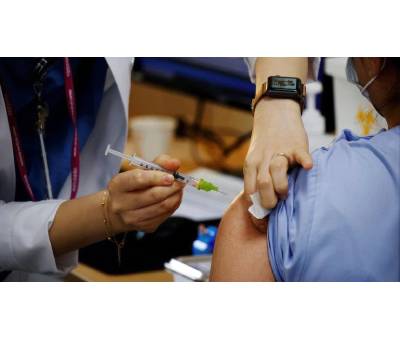 A full course of two of the most widely available coronavirus vaccines is about as effective against the more contagious delta variant as it was against a previously dominant version of the virus, according to a study published in the New England Journal of Medicine.
A full course of two of the most widely available coronavirus vaccines is about as effective against the more contagious delta variant as it was against a previously dominant version of the virus, according to a study published in the New England Journal of Medicine.
Two doses of the Pfizer-BioNTech vaccine offer 88 percent protection against symptomatic disease caused by the delta variant, compared to 94 percent against the alpha variant that was first discovered in Britain and became dominant across the globe earlier this year, the study said.
A double dose of the Oxford-AstraZeneca vaccine was 67 percent effective against delta, according to the British researchers, down slightly from an efficacy rate of 75 percent against the alpha variant.
Here are some significant developments:
- China said Thursday that it will not accept the World Health Organization’s suggested plan for the second phase of investigation into the origins of the coronavirus. A senior Chinese health official criticized the agency’s proposal to include the lab-leak hypothesis as a research priority.
- Officials announced that some 200 million people or more than half of all adults in the European Union have now been fully vaccinated.
- The United States has extended restrictions on nonessential travel at the borders with Canada and Mexico until Aug. 21. The Department of Homeland Security said the decision was made because of the “continued transmission and spread of [the virus] within the United States and globally.”
- Australia’s most populous state Thursday reported its highest number of new, locally transmitted cases for the year, even as much of the country remained under lockdown to stem an outbreak of the more contagious delta variant. New South Wales, which includes Sydney, recorded 124 new infections, health authorities said.
- Tunisia’s president has ordered the military to oversee the country’s coronavirus response as the North African nation battles its worst outbreak of the pandemic. Earlier this week, the health minister was fired for bungling Tunisia’s vaccine rollout as the virus spread.
- The Tokyo 2020 Organizing Committee announced 12 new coronavirus cases among accreditation holders, including two unnamed athletes who were living in the Olympic Village. Eight athletes have tested positive since arriving in Tokyo for the Games.
The authors of the new study said a single dose of either the Pfizer-BioNTech or the Oxford-AstraZeneca vaccine was significantly less effective against the delta variant than two doses. One dose of the vaccine developed by U.S. firm Pfizer with German partner BioNTech was just 36 percent effective, the study found, while a single shot of the vaccine from Oxford University and British-Swedish company AstraZeneca offered 30 percent protection.
“Absolute differences in vaccine effectiveness were more marked after the receipt of the first dose,” the authors wrote. The research confirmed earlier data released by Public Health England that suggested the two vaccines offered similar levels of protection against the delta variant when administered as a full course. It also offered some hope to those nations struggling to beat back outbreaks caused by the delta variant, which the World Health Organization says has reached at least 124 countries.
The study stood in contrast to preliminary data made public by Israel’s Health Ministry earlier this month that said the Pfizer-BioNTech vaccine was only 64 percent effective in preventing symptomatic infection caused by the delta variant. Some public health experts warned that the data from Israel was observational and not the result of a controlled study.
